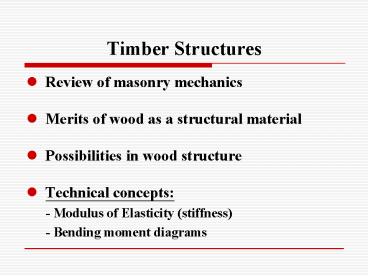Timber Structures PowerPoint PPT Presentation
1 / 24
Title: Timber Structures
1
Timber Structures
- Review of masonry mechanics
- Merits of wood as a structural material
- Possibilities in wood structure
- Technical concepts
- - Modulus of Elasticity (stiffness)
- - Bending moment diagrams
2
Masonry Structure
- Must act in compression (no resistance to
tension) - Very high compressive strength
- -Design is a problem of form
- -Stability and not strength limits masonry
- Thrust line line of forces acting within a
masonry structure to ensure that compression is
maintained
3
Construction Process
4
Construction Process
5
Construction Process
6
Construction Process
7
Masonry Design Line of Thrustmust be within the
masonry
8
Eladio Dieste (1917-2000)
- Trained as a civil engineer in Uruguay
- 1947 Completed Casa Berlingieri with his first
use of reinforced brick - 1960 Completed Church of Atlantida
- 1995 Retrospective of his career held in Spain
9
The Future of Brick Vaulting
- Reasons for superiority of brick over reinforced
concrete for thin shells - Less cement
- Formwork is removed much more quickly
- Vaults are more lightweight
- Easier to achieve double curvature with brick
- Low stresses in well-designed shells
10
The Future of Brick Vaulting
- The things that we build must have something
that we could call cosmic economy, that is to be
in accord with the profound order of the world. - -Eladio Dieste
- The need for sustainable structures will require
us to combine traditional methods of construction
with new technologies.
11
- Only one primary building material comes from a
renewable resource, cleans the air and water
utilizes nearly 100 of its resource for
products is the lowest of all in its energy
requirements for its manufacturing creates fewer
air and water emissions than any of its
alternatives and is totally reusable, recyclable
and 100 biodegradable. And it has been
increasing in US net reserves since 1952, with
growth exceeding harvest in the US by more than
30.
12
American Wood Council
- Only one primary building material comes from a
renewable resource, cleans the air and water
utilizes nearly 100 of its resource for
products is the lowest of all in its energy
requirements for its manufacturing creates fewer
air and water emissions than any of its
alternatives and is totally reusable, recyclable
and 100 biodegradable WOOD. And it has been
increasing in US net reserves since 1952, with
growth exceeding harvest in the US by more than
30.
13
Properties of Timber
- Cellular structure is very efficient
- Handles both compression and tension well
- Different strengths with and against the grain
- Inhomogeneous material with imperfections
14
Progress Ideology of Metal
- Airplane designers from 1920-1940 neglected wood,
though it was superior to metal in many design
considerations. - Engineers linked metal with technical progress
wood was anathema to the ideals of precision and
power. - Article by Schatzberg, Technology Culture,
January, 1994.
15
Stiffness (E) per unit weight
16
Embodied Energy per Stiffness
17
Embodied Energy per Stiffness
18
Timber Grid Shells
19
Japanese Pavilion, Hanover, 2000
20
Expo Pavilion, Hanover, 2000
21
Conclusions
- Wood is a highly engineered, sustainable material
- Underused many possibilities for wood as a
structural material - Stiffness (modulus of elasticity) measures the
deformation in relation to an applied load - Bending moments for simply-supported beams can be
derived from the hanging cable for the given
loading
22
Ecological Profile of Materials
23
Material Properties
24
Material Properties

